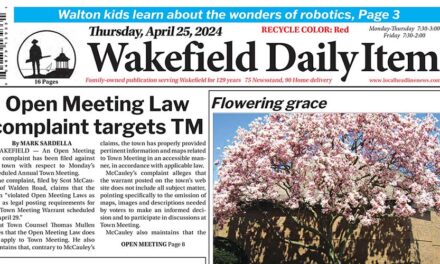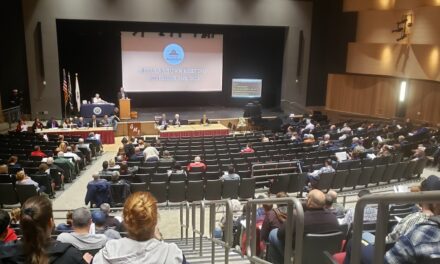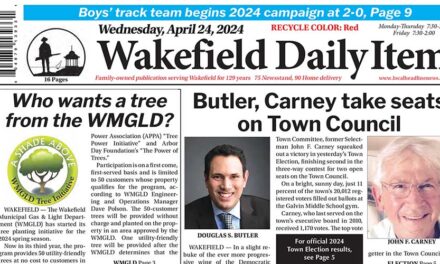Published in the April 19, 2018 edition.
The Daily Item posed two questions to the candidates for Board of Selectmen in the April 24 Town Election. Incumbents Paul R. DiNocco and Brian E. Falvey are being challenged by Deborah M. Butler and Julie Smith-Galvin. Two will be elected.
Question 1: The town has a pretty healthy Rainy Day account. Are there any projects you’d like to see the town undertake and pay for with these funds that are not currently on officials’ radar screen?
“As you may know, there are several possible endeavors that may need to be addressed or will be addressed in the upcoming years,” current board chairman DiNocco said. “Roads and Sidewalks will always be a top priority. We recently began developing the Main Street Transformation project. The Public Safety Building needs work and we need to address the condition of the DPW barn at some point. Then add to the mix, a possible new High School.
“If there was one thing that I would like to see get started is the drainage plan to clean the Mill River. It’s long overdue, flooding caused by that river should somehow get addressed.
“The term Rainy Day account is a bit misleading as well,” DiNocco said. “The selectmen approved a reserves policy about 5 years ago. The Free Cash account, if possible, would be 7% of our operating revenue. Stabilization was set at 3% and the Reserve Fund at .5% By forward thinking our savings, we have a comfortable margin of resources at our disposal if it is needed. Besides, we can’t be of the mind that just because we have reserves, that it means we need to spend them all.”
Selectman Brian Falvey agreed that the term “rainy day fund” is a misnomer.
“The most important part of any response to this question is necessarily a recognition that the town does not actually have a ‘Rainy Day account.,’ “ Falvey said. “We do however have a concept in our budget known as “Free Cash,” which is an often misunderstood name.
“Each year, as part of our budget process, we project what our revenue and expenses will be in operating the entire town. Sometimes the actual revenue we collect exceeds what we had projected — such as when state funding is higher than anticipated, more local meals and hotel tax revenue is generated, or the property taxes actually paid are greater than expected. We have been experiencing this phenomenon lately due to the growth in our tax base; our property values are rising because we are on an upward trajectory. The Galvin Middle School, our new turf fields, recent zoning changes, etc., have all led to the positive growth we have lacked for so many years. The situation is even better if we manage our operating budgets well, or even have some luck, such as a very light snow year. We have implemented sound financial management and policies, and the culture in Town Hall has shifted such that department heads typically find ways to spend less than budgeted. These improvements often result in our actual expenses being lower than projected.
“When actual collections exceed actual expenditures, the difference is characterized as “Free Cash.” It is free because it has not yet been appropriated, or tied, to any particular purpose, which is required by law before any money can be spent. Notably, before any such excess funds can be appropriated, the town’s balance sheet as of July 1 needs to be certified by the Commonwealth and the use of Free Cash must then be approved at Town Meeting. The process is more sophisticated than simply tucking some money away for a “rainy day,” and the existence and use of free cash is actually a significant factor that drives our town’s bond rating. It is a key indicator of sound financial management that drives down our cost of capital (interest rate) so that we can issue bonds to fund large projects such as the Galvin Middle School reconstruction, the Recreation Bond that installed turf fields and tennis courts, or a future bond issue to renovate our Public Safety Building. Generating Free Cash is important, and, ironically, not spending it can actually improve our ability to fund the larger projects that may be on our ‘wish list.’
“With that said, if we wanted to responsibly spend some of the Free Cash we generate, then I would like to see it spent on a healthy mix of needs and wants. As it is one-time use money, it would be improper to use it to fund operating expenses, so it should be used for capital acquisitions, or short-term projects. While the amount of Free Cash varies from year-to-year, know that the amount would be too small to fund a large project like the renovation or construction of a building such as a rink, or high school. So, a list of desires needs to be realistic.
“As for needs, there is always a desire for upgraded equipment for our Fire and Police Departments to help modernize radio communications, or improve the training or physical safety of our personnel. Our Police Chief and Fire Chief are always looking around the corner to prepare for future threats; there are often investments we make that can help them be ahead of the readiness curve. I have a strong preference to see investments made in Public Safety because they benefit every person in Wakefield.
“Our town assets could also benefit from investment — ranging from our McCarthy Senior Center, to our Albion Cultural Exchange, to the Americal Civic Center. We could also invest in some additional sidewalk and road paving/construction, which seems to get short-changed year-over-year as Chapter 90 Highway Funding continually comes up short.
“I would also strongly consider projects that affect our natural assets and open spaces. Lake Quannapowitt is always a worthy target for environmental improvement projects that help maintain our lake as the crown jewel of Wakefield. We could also continue to invest in our Common and implement projects like the renovation of our Soldiers and Sailors Civil War Monument.
“Finally, there are always opportunities to invest in our commercial and retail areas in the town. I would like to see an investment in community branding that carries a common theme from Greenwood through Downtown, to the head of Lake Quannapowitt. The power of connecting these areas into one cohesive brand—versus separate, almost competitive zones—would be an incredible draw for retailers and shoppers alike. I would like to see an investment in common public street signage, crosswalk treatments, street lights and messaging that pervades all of the retail areas along Main Street (from Melrose to Reading) and North Ave, as well as secondary areas like Four Corners, the Water Street Corridor, and Salem Street. We need to harness the diversity of our geography into one combined destination for people to live, work, shop and be entertained.
“Investments like this further celebrate and promote the strong community ties that make Wakefield such a special place to live,” Falvey said. “No matter how or where we invest, we need to stay tied to that core tenet that personifies our town.”
Candidate Deb Butler outlined her preferences for the town’s reserves.
“I’d like to keep a good portion of the Rainy Day fund intact as it’s designed to provide protection against budget cuts and layoffs during economic downturns,” Butler noted. “Having said that, there are small appropriations that would greatly enhance our town’s general appeal and infrastructure. More robust and consistent tree service, planting as well as pruning and removal of dangerous oft reported trees. Schedule the sidewalk repairs on smaller side streets that get continually back-burnered, the road repairs on residential side streets and curb repairs. I’d love to see a community poll where everyone puts forth their wish list for residential repair and see what it looks like in the aggregate. At some point in time, we need to address the erosion around the lake adjunct to the sidewalk and devise a way to maintain cleanliness in business districts that isn’t reliant on pressuring the tenant business owners.”
Julie Smith-Galvin explained her view of the town’s reserve funds.
“We should not think of this ‘healthy’ reserve as money sitting idly in a bank,” she said. “These funds are working hard for Wakefield. Their availability, and the discipline to build them up, directly translates into a strong credit rating and the ability to borrow at favorable terms. The value of this can not be understated, especially given the capital and infrastructure needs Wakefield faces in the coming years. Furthermore, knowing we have these funds gives us the comfort we need to embark on programs that help our most vulnerable. An example is the upcoming Town Meeting proposal for Wakefield to match the state’s property tax credit, giving qualified seniors double the tax relief they currently have. Finally, without this cushion, our ability to absorb situations such as unrelenting winters or unfunded state mandates, would negatively impact future funding for basic services like schools, fire and police.
“I would like to see us make these reserves work even harder for Wakefield,” Smith Galvin said. “Do we know where the over $7 million in Free Cash is invested? While I am confident our current investment policy is financially sound, I wonder whether it also reflects our community values. Seeking investments that optimize returns while also improving environmental, social and governance practices is now common and proven. As a business owner, I understand the importance of strong financial stability and returns. I also believe that they are not mutually exclusive with making our money work to build a better world. In conclusion, I think that our current policy of maintaining Free Cash reserves at 8% of annual budget is prudent and should be maintained. We should view the funds as an insurance plan that helps us serve the needs of our residents while exploring whether the funds can be invested to provide both financial and social returns.”
Question 2. Is there any reason for the town to regret not approving a downtown parking garage?
“A parking garage would have certainly eased parking frustrations,” Smith-Galvin said, “but it did not have the broad support needed to come to fruition. It is time to look forward, not backward. Parking scarcity remains a common complaint. I do not deny there are challenges, but I would propose some alternative solutions for consideration.
“First, we should ensure that we offer sufficient parking spaces for those with disabilities,” Smith Galvin added. “Second, we should support our businesses and convert some spots to dedicated, short-term (i.e. 15 minute) parking for take-out pickup or other quick errands, while also working with restaurants to offer space for valet parking away from prime parking areas. Third, we should truly inventory existing spaces and their time-of-day usage. Not all spaces are needed all the time. For example, Town Hall has over 50 spaces that can be open to public parking outside of operating hours. We can direct drivers to these available spaces via websites, social media, interactive apps and/or traditional street signage. Finally, we should think beyond cars and encourage walking, biking and public transportation by supporting quality sidewalks, bike racks and reliable bus/commuter rail services.”
Butler shared her views on parking in the downtown.
“Between Frank Sinatra in my head and the following quote from Alexander Graham Bell, what I can say about the garage and ‘regret’ is this. When one door closes, another opens; but we often look so long and so regretfully upon the closed door that we do not see the one which has opened for us.”
“We need to address parking, Butler said. “Let’s instead be advocating for flat lots interspersed throughout the community, consistent and expected parking enforcement, 15 minutes spaces available in some locales, and implement then enforce strict policies around construction vehicle parking during large commercial builds.”
Falvey observed that the people have had their say on the parking garage.
“The vote of the people reigns supreme in our democracy and must be respected.” Falvey said. “With that in mind, ‘regret’ is not the best choice of words. The proper lens through which the garage vote should be viewed is simply hindsight.
“At the time, voters were asked to approve something largely intangible — a significant building and change in use in our downtown. The status quo typically prevails when a decision is risky, uncertain, or misunderstood. And, not surprisingly, the status quo prevailed with the garage vote, which some feel became a proxy for a referendum on Brightview or assisted living in general.
“Now that Brightview has been constructed absent a garage, we need to take the pulse of the community. With the benefit of both hindsight and the ability to view the building and surrounding area in person, I would ask if public opinion has changed. Notably, if there is an interest in pursuing a garage in that location, there may still be an opportunity to utilize the town’s land-locked parcel in conjunction with an adjacent parcel to make a garage happen. If asked, given my deep involvement for almost two years with the prior development, I would be happy to lead the effort to make a parking garage, or something like it, a reality. My mind is open to considering alternative parking solutions, or alternative uses for our land, but the impetus for the change ought to come from and be driven by the people of Wakefield. Common areas like our downtown belong to the people and significant changes there need to be fueled by strong consensus. I look forward to exploring creative use for that land, and creative solutions both downtown and in our other significant retail areas.
“Abraham Lincoln’s famous line from The Gettysburg Address over 150 years ago remains true today in all of Government, especially here in Wakefield. We are a ‘government of the people, by the people, for the people.’ The outcome of any vote by the people of Wakefield must be respected and implemented and certainly never regretted,” Falvey concluded. “There are many votes ahead of us; I look forward to them all.”
DiNocco noted that parking in the downtown isn’t a new issue.
“We have been trying to deal it for quite some time now,” he said. “The garage would have been a welcome addition to the Brightview project. There is some regret that we couldn’t make the case for the benefits it would have brought. Wakefield is moving towards making the town more walkable. We are waiting to hear from our hired consultants as to what possible suggestions they will present when we begin to make roadway changes to Main Street in regards to parking and where to place it.”




